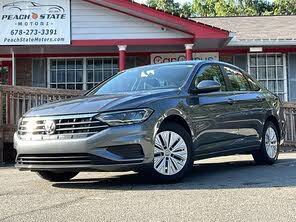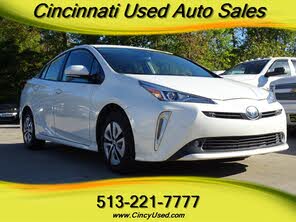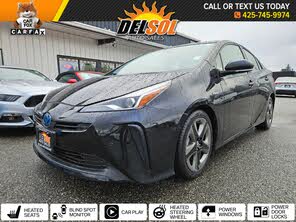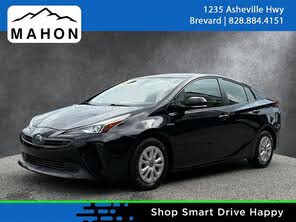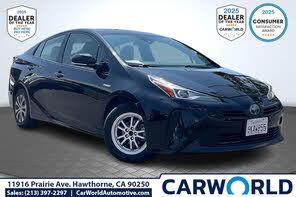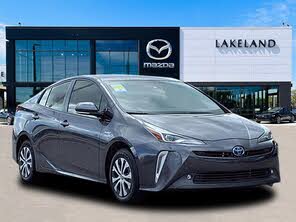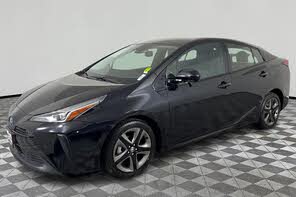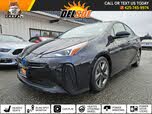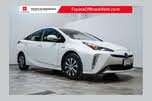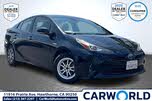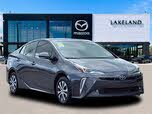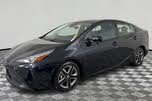2019 Volkswagen Jetta vs 2020 Toyota Prius
Overview | |
MSRP$18,745 | MSRP$24,325 |
Listings1113 | Listings110 |
Ratings & Reviews | |
User Reviews | User Reviews |
Expert reviews8.2 out of 10 | Expert reviews7.5 out of 10 |
Pros
Cons
| Pros
Cons
|
2019 Volkswagen Jetta Reviews SummarySmall cars aren't asked to do much beyond the basics: provide efficient, reliable transportation at a manageable price. Plenty of models fit this form, and in some rare cases, they manage to do it while also being fun to drive, like the Mazda3. In other cases, the vehicle manages to feel more upscale than the competition, like the Honda Civic. But the Volkswagen Jetta's legacy has historically been defined by its ability to offer both an upscale interior and a rewarding driving experience. But then something happened with the Jetta. Starting with the 2011 model year, Volkswagen attempted to broaden the Jetta's appeal, and until 2018 we were left with a drab interior, an underpowered engine, and an uninspiring driving experience. VW’s hallmark was always that its cars felt a little special, so by adopting a homogenous look and feel, VW removed what made the Jetta unique and desirable to its fans. So Volkswagen had some work to do with the new seventh-generation 2019 Jetta. Will this new car move the Jetta name back toward driving refinement and upscale feel? Or will it continue to disappoint as just another bland entrant among small cars? | |
2020 Toyota Prius Reviews SummaryEver heard of an eponym? It’s a brand or product that is so popular that it’s come to define its respective market. Think of Kleenex for tissues or Band-Aid for medical bandages. For hybrids, the Toyota Prius has ascended to near-eponym status. It was one of the first—and remains one of the most popular—hybrids ever made. As automakers across the industry are rolling out more hybrid models, the Prius continues to be the standard-bearer of this genre. This is largely due to the fact that the Prius is a dedicated hybrid, rather than a hybrid variant of an existing model. Throughout the industry, different companies are taking different approaches to alt-fuel vehicles, including full-electric and hydrogen fuel cell powertrains. The Prius endures as the leader in hybrid power due to a focus on fuel efficiency that doesn’t compromise on style, drivability, and versatility. So how does the Prius hold its ground as more players enter the fray? Read on to find out. | |
No video found | |
Popular Features & Specs | |
Engine1.4L 147 hp I4 | Engine1.8L 121 hp I4 Hybrid |
Drive TrainFWD | Drive TrainFWD |
Seating Capacity5 | Seating Capacity5 |
Horsepower147 hp @ 5000 rpm | Horsepower |
EV Battery Capacity | EV Battery Capacity0.7 kWh |
MPG City30 | MPG City58 |
MPG Highway40 | MPG Highway53 |
Engine | |
Engine Name1.4L 147 hp I4 | Engine Name1.8L 121 hp I4 Hybrid |
Torque184 lb-ft @ 1400 rpm | Torque |
Horsepower147 hp @ 5000 rpm | Horsepower |
DrivetrainFWD | DrivetrainFWD |
Fuel Economy | |
EV Battery Capacity | EV Battery Capacity0.7 kWh |
MPG City30 | MPG City58 |
MPG Highway40 | MPG Highway53 |
Interior | |
Seating Capacity5 | Seating Capacity5 |
Safety | |
Front Crash Overall4 | Front Crash Overall4 |
Side Crash Overall5 | Side Crash Overall5 |
Dimensions & Capacity | |
Cargo Space14.1 cu ft | Cargo Space27.4 cu ft |
Curb Weight2959 lbs | Curb Weight3010 lbs |
Height57.4 in | Height57.9 in |
Length185.1 in | Length180.0 in |
Width70.8 in | Width69.3 in |
Wheelbase105.7 in | Wheelbase106.3 in |
Maximum Payload970 lbs | Maximum Payload825 lbs |
Number of doors4 | Number of doors4 |
Overview | ||
MSRP | $18,745 | $24,325 |
Listings | ||
Ratings & Reviews | ||
User reviews | ||
Expert reviews | 8.2 out of 10Read full review | 7.5 out of 10Read full review |
Pros & cons | Pros
Cons
| Pros
Cons
|
Summary | Small cars aren't asked to do much beyond the basics: provide efficient, reliable transportation at a manageable price. Plenty of models fit this form, and in some rare cases, they manage to do it while also being fun to drive, like the Mazda3. In other cases, the vehicle manages to feel more upscale than the competition, like the Honda Civic. But the Volkswagen Jetta's legacy has historically been defined by its ability to offer both an upscale interior and a rewarding driving experience. But then something happened with the Jetta. Starting with the 2011 model year, Volkswagen attempted to broaden the Jetta's appeal, and until 2018 we were left with a drab interior, an underpowered engine, and an uninspiring driving experience. VW’s hallmark was always that its cars felt a little special, so by adopting a homogenous look and feel, VW removed what made the Jetta unique and desirable to its fans. So Volkswagen had some work to do with the new seventh-generation 2019 Jetta. Will this new car move the Jetta name back toward driving refinement and upscale feel? Or will it continue to disappoint as just another bland entrant among small cars? | Ever heard of an eponym? It’s a brand or product that is so popular that it’s come to define its respective market. Think of Kleenex for tissues or Band-Aid for medical bandages. For hybrids, the Toyota Prius has ascended to near-eponym status. It was one of the first—and remains one of the most popular—hybrids ever made. As automakers across the industry are rolling out more hybrid models, the Prius continues to be the standard-bearer of this genre. This is largely due to the fact that the Prius is a dedicated hybrid, rather than a hybrid variant of an existing model. Throughout the industry, different companies are taking different approaches to alt-fuel vehicles, including full-electric and hydrogen fuel cell powertrains. The Prius endures as the leader in hybrid power due to a focus on fuel efficiency that doesn’t compromise on style, drivability, and versatility. So how does the Prius hold its ground as more players enter the fray? Read on to find out. |
Video | No video found | |
Popular Features & Specs | ||
Engine | 1.4L 147 hp I4 | 1.8L 121 hp I4 Hybrid |
Drive Train | FWD | FWD |
Seating Capacity | 5 | 5 |
Horsepower | 147 hp @ 5000 rpm | |
EV Battery Capacity | 0.7 kWh | |
MPG City | 30 | 58 |
MPG Highway | 40 | 53 |
Engine | ||
Engine Name | 1.4L 147 hp I4 | 1.8L 121 hp I4 Hybrid |
Torque | 184 lb-ft @ 1400 rpm | |
Horsepower | 147 hp @ 5000 rpm | |
Drivetrain | FWD | FWD |
Fuel Economy | ||
EV Battery Capacity | 0.7 kWh | |
MPG City | 30 | 58 |
MPG Highway | 40 | 53 |
Interior | ||
Seating Capacity | 5 | 5 |
Safety | ||
Front Crash Overall | 4 | 4 |
Side Crash Overall | 5 | 5 |
Dimensions & Capacity | ||
Cargo Space | 14.1 cu ft | 27.4 cu ft |
Curb Weight | 2959 lbs | 3010 lbs |
Height | 57.4 in | 57.9 in |
Length | 185.1 in | 180.0 in |
Width | 70.8 in | 69.3 in |
Wheelbase | 105.7 in | 106.3 in |
Maximum Payload | 970 lbs | 825 lbs |
Number of doors | 4 | 4 |
The 2019 Volkswagen Jetta presented a more upscale presence compared to its predecessor, thanks to its slightly longer and wider dimensions. The new angular grille, inspired by the VW Arteon sport sedan, added a dramatic flair to the Jetta's exterior. Inside, the cabin continued this angular design language, creating a spacious and attractive environment with a premium feel. The seats were notably comfortable, making long drives pleasant. The base S trim, which Volkswagen sent for review, came well-equipped with features like 16-inch alloy wheels, LED head- and taillights, and a 6.5-inch touchscreen display with Apple CarPlay and Android Auto.
The 2020 Toyota Prius maintained its iconic jellybean-like shape, optimized for aerodynamics. Despite its hatchback design, Toyota added sedan-like visual cues to modernize its appearance. The Prius's cabin was futuristic, with centrally located instrumentation and gauges. The entry-level L Eco trim included 15-inch alloy wheels, automatic climate control, and a 7-inch touchscreen with Apple CarPlay, Android Auto, and Amazon Alexa compatibility. Higher trims like the XLE and Limited added features such as synthetic leather upholstery, an 11.6-inch touchscreen, and adaptive headlights.


















The 2019 Volkswagen Jetta featured a 1.4-liter turbocharged inline 4-cylinder engine, producing 147 horsepower and 184 pound-feet of torque. Despite having 3 fewer horsepower than the previous model, the engine felt more responsive, especially from a stop. The new 8-speed automatic transmission replaced the older 6-speed, enhancing both power delivery and efficiency. The Jetta's steering was well-weighted and precise, offering a blend of smooth and sporty handling. Both the manual and automatic transmissions returned an impressive 30 mpg city, 40 highway, and 34 combined.
The 2020 Toyota Prius combined a 1.8-liter four-cylinder engine with an electric motor, delivering a total of 121 horsepower and 105 pound-feet of torque. The Prius AWD-e variant added a second electric motor for the rear wheels, operating up to 43 mph. The Prius offered smooth acceleration and seamless transitions between electric and conventional power. It featured three drive modes: EV, Eco, and Power, each catering to different driving needs. The unique shifter design and Engine Braking mode added to its distinct driving experience. The Prius handled well for a hybrid, with a low center of gravity contributing to sharper handling and a smooth ride.
The 2019 Volkswagen Jetta's front seats were comfortable for long trips, and both front and rear legroom were adequate despite slight reductions. Trunk space decreased to 14.1 cubic feet from the previous 15.7 cubic feet but remained average for the class. The cabin layout was practical, with the touchscreen positioned above the climate vents and the shifter moved back for easier access. The blend of touchscreen functions with real buttons and dials emphasized practicality.
The 2020 Toyota Prius made excellent use of its space, with deep door pockets and a large tray area between the front seats. The front seats provided ample headroom and legroom, and the rear seats were spacious as well. The Prius offered 50.7 cubic feet of cargo space with the rear seats folded and 24.6 to 27.4 cubic feet with the seats up, depending on the model. This made the Prius one of the most versatile options among hybrid and electric vehicles, with its hatchback design facilitating easy loading of large items.
The 2019 Volkswagen Jetta came standard with a 6.5-inch touchscreen display featuring Volkswagen’s Car-Net App-Connect, Apple CarPlay, and Android Auto. Higher trims like the SEL and SEL Premium included Volkswagen’s Digital Cockpit, a customizable 10.25-inch digital display that could project navigation and other information directly in front of the driver.
The 2020 Toyota Prius featured a standard 7-inch touchscreen with a sensible menu layout, Apple CarPlay, Android Auto, Bluetooth connectivity, a WiFi hotspot, and three USB ports. The Limited trim upgraded to an 11.6-inch screen with a customizable layout, though it lacked Android Auto. The Prius also offered satellite radio, HD Radio, a head-up display, and a 10-speaker JBL premium audio system. The top-center instrument panel, a hallmark of Prius design, provided critical readouts and hybrid drivetrain status.
The 2019 Volkswagen Jetta included front and side airbags, a reversing camera, and a tire pressure monitoring system. An automatic post-collision braking system was also standard. Driver-assist features like blind-spot monitoring, rear cross-traffic alert, and forward-collision avoidance were standard on higher trims and optional on the base S. The SEL and SEL Premium trims added adaptive cruise control, lane-keeping assist, and automatic high beams.
The 2020 Toyota Prius came with Toyota Safety Sense 2.0, which included automatic emergency braking, forward-collision warning, lane-departure warning, adaptive cruise control, and automatic high beams. Optional features included blind-spot monitoring, rear cross-traffic alert, parking sensors, and active park assist. The Prius earned a five-star rating from the NHTSA and a "Top Safety Pick" from the IIHS, though it fell short of the highest "Top Safety Pick+" rating.
CarGurus highlights
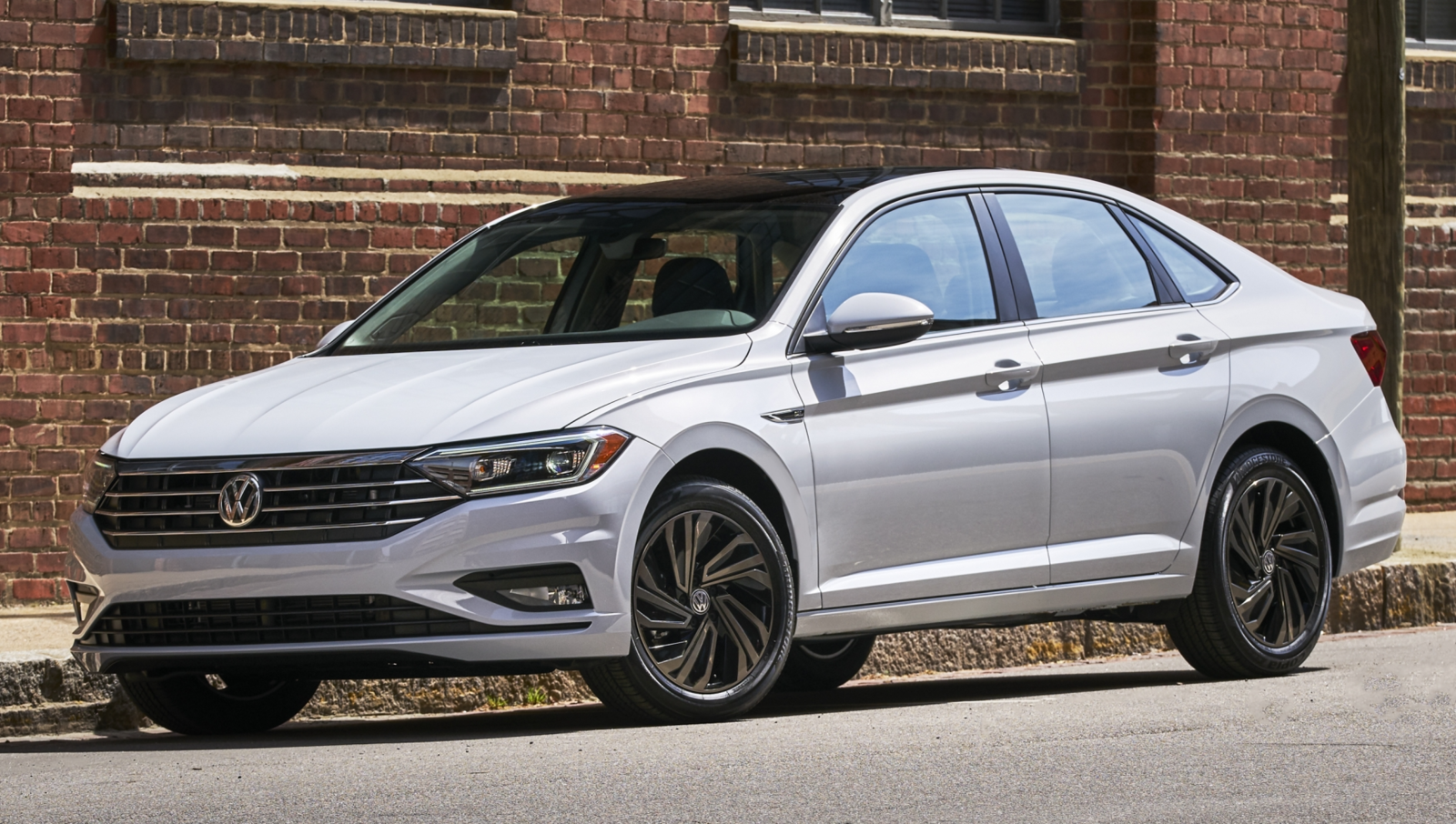
According to CarGurus experts, the overall rating for the 2019 Volkswagen Jetta is 8.2 out of 10, while the 2020 Toyota Prius scores 7.5 out of 10. Based on these ratings, the 2019 Volkswagen Jetta is the recommended choice, offering a more engaging driving experience, practical features, and a higher overall rating.
Choose the 2019 Volkswagen Jetta if:
- You prefer a more upscale and dramatic exterior design.
- You value a blend of smooth and sporty handling.
- You want a practical and well-equipped base trim with modern technology.
Choose the 2020 Toyota Prius if:
- You need a highly efficient hybrid with versatile cargo space.
- You appreciate a futuristic cabin design with centrally located instrumentation.
- You prioritize advanced safety features and high safety ratings.
CarGurus highlights

According to CarGurus experts, the overall rating for the 2019 Volkswagen Jetta is 8.2 out of 10, while the 2020 Toyota Prius scores 7.5 out of 10. Based on these ratings, the 2019 Volkswagen Jetta is the recommended choice, offering a more engaging driving experience, practical features, and a higher overall rating.
Choose the 2019 Volkswagen Jetta if:
Shop Now- You prefer a more upscale and dramatic exterior design.
- You value a blend of smooth and sporty handling.
- You want a practical and well-equipped base trim with modern technology.
Choose the 2020 Toyota Prius if:
Shop Now- You need a highly efficient hybrid with versatile cargo space.
- You appreciate a futuristic cabin design with centrally located instrumentation.
- You prioritize advanced safety features and high safety ratings.

By: CarGurus + AI
At CarGurus, our team of experienced automotive writers remain at the heart of our content operation, conducting hands-on car tests and writing insightful guides that are backed by years of industry experience. To complement this, we are harnessing AI to make our content offering more diverse and more helpful to shoppers than ever. To achieve this, our AI systems are based exclusively on CarGurus content, ratings and data, so that what we produce is both unique to CarGurus, and uniquely helpful to car shoppers.

